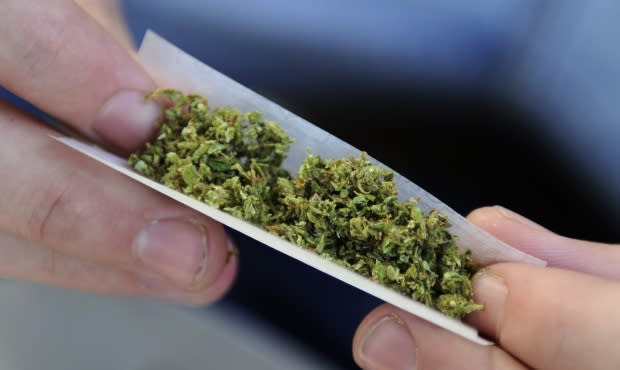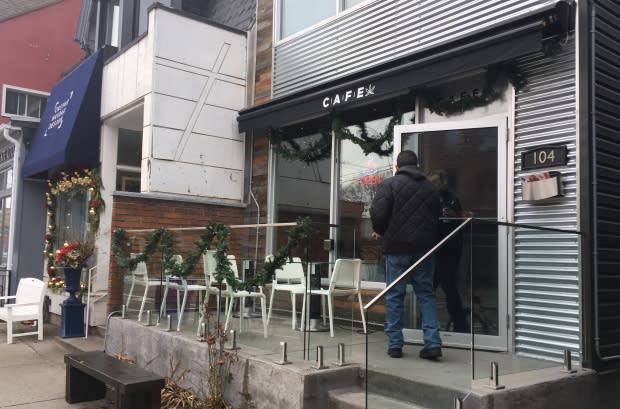More than a dozen illegal cannabis stores still operating in Toronto, but closing them a 'complex process'
More than a dozen illegal cannabis shops are still operating in Toronto following a post-legalization crackdown, CBC Toronto has learned, but the city says it's a "complex process" to shut them all down.
Currently, city staff from the Municipal Licensing and Standards department are investigating 16 illegal storefronts in total.
The last publicized crackdown from bylaw officers and police happened on October 19 — two days following legalization — and involved five shops in various areas of the city. Toronto police also charged and released eight people under the new legislation, which makes it illegal to buy marijuana from anyone other than the province's online website.
Staff are still working closely with Toronto police to "close all illegal storefronts that are found to be open and operating," city spokesperson Lyne Kyle shared in a statement, but doing so is proving to be a "complex process involving a number of steps."
Coun. Jim Karygiannis said the city is simply in a "tough position" thanks to the change in approach to legalization between the prior Liberal and current PC provincial governments.
The Liberals had planned to open 40 government-run retail cannabis shops by the summer of 2018, with the network of stores to expand to 150 by 2020. The Tories changed to a government-run online store and private retail model, saying it would better address demand and curb black market sales.
'There's not clarity out there'
"There's not clarity out there, and we need to provide clarity to the people operating the stores, to the people looking to get the medicinal as well as recreational cannabis," he said.
Karygiannis also questioned the province's current phased approach to allowing private bricks-and-mortar storefronts.
Months after saying it would not cap the number of licenses for retail pot shops after cannabis was legalized, the PC government reversed course in December, saying it will now only be able to issue 25 licenses by April.
Toronto will only get five of the 25 licenses for storefronts, according to the province, with the lottery happening on January 11.

That small number of licenses won't meet the user demand, said Karygiannis, who also backs shutting down the remaining illegal storefronts.
Amid ongoing discussion and changes surrounding legal cannabis shops, Kyle stressed that enforcement of the current illegal shops takes time.
She added the city remains committed to inspecting previously reported locations to ensure compliance, identifying newly-opened storefronts, and responding to complaints.
Customers, business owners don't want closures
But for users of the last handful of stores, down from dozens before multiple rounds of raids in recent years, the looming possibility of another crackdown is frustrating.
"We're going to miss having this kind of place," said Francisco Franv, a regular customer of CAFE, a cannabis cafe near Harbord Street and Spadina Avenue.
Franv, who was among roughly a dozen customers in the main floor of the shop on Wednesday afternoon — which offers juice and baked goods in glass cases, alongside cannabis goods for sale elsewhere — said he buys both coffee and edibles at the quiet cafe.
"We think there's no sense shutting down this place," he added. "We're going to be really, really sad."
The team behind the shop, however, plans to remain open in the face of raids and industry changes.
"[We] will continue to provide reasonable dignified access, urgent on demand products and a right to choice for our patrons," said James Shaung, a spokesperson for CAFE, who also shared concerns about the province's current lottery approach, ongoing cannabis shortages, and the negative impact of police raids.

There is simply no incentive for cannabis sellers to shut down even in the face of another crackdown, noted Abi Roach, owner of HotBox Cafe in Kensington Market — a nearly two-decade-old store long known for selling cannabis paraphernalia rather than pot itself.
Roach, who is hoping to land one of the five licenses for Toronto, stressed the high level of confusion for both business owners like herself and for consumers as to the current rules and opportunities surrounding legal pot.
When it comes to the lottery, there's also a degree of unfairness, she suggested.
"It's absolutely a mess and it's kind of lazy," Roach said.
"The reality is, now every Tom, Dick and Harry can throw $75 and their name in a ring — and there are people ready and preparing for the process for a very long time, and now we're on the same par."

